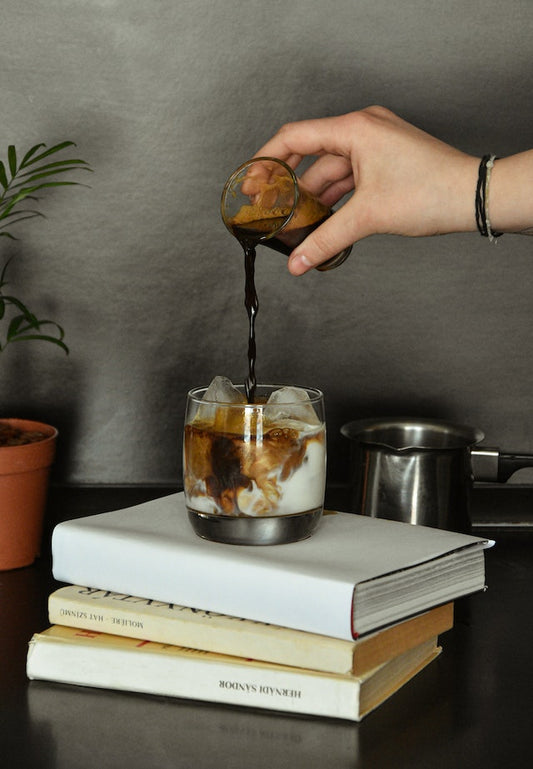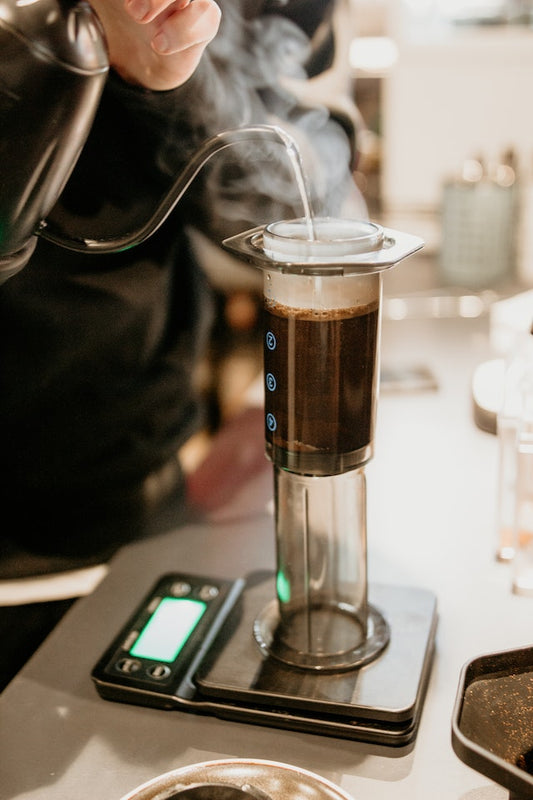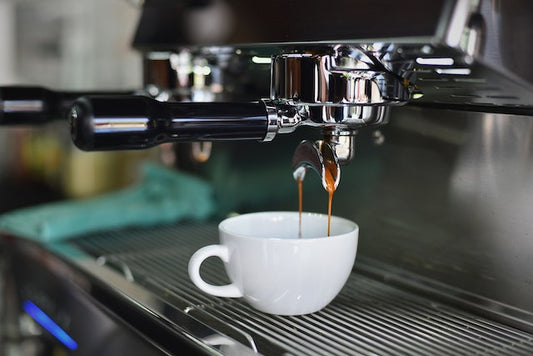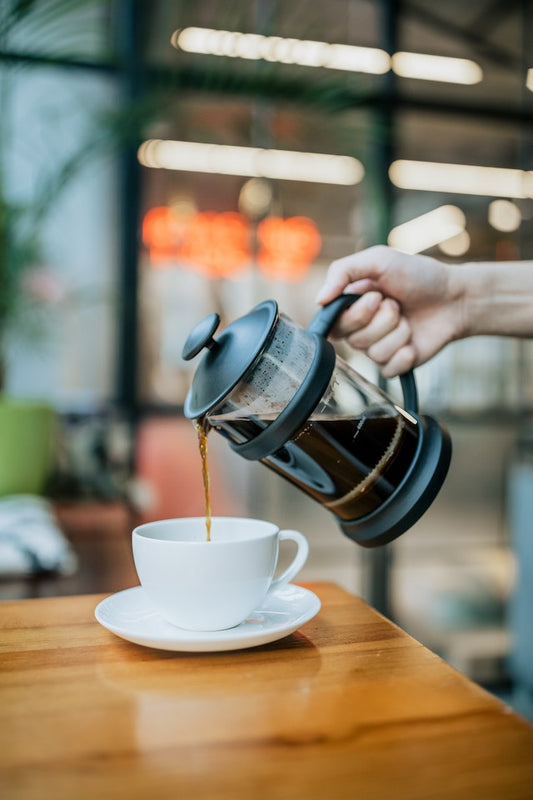Coffee has become an essential part of our daily lives, providing us with that much-needed boost of energy and a moment of indulgence.
However, with the rise of convenience and technology, the traditional methods of brewing coffee have transformed.
Coffee beans and coffee capsules are two popular options that cater to different preferences and lifestyles.
In this comprehensive comparison, we will explore the differences between coffee beans and coffee capsules, unravelling the intricacies of their production, flavour profiles, environmental impact, and ultimately help you make an informed choice when it comes to your daily cup of joe.

Understanding the Basics: What are Coffee Beans and Coffee Capsules?
Coffee Beans:
Coffee beans are the seeds of the Coffea plant, which is native to tropical regions around the world. These beans are the foundation of traditional coffee brewing methods and have been used for centuries to produce a rich and flavorful beverage. Coffee beans come in various varieties, each offering unique taste profiles and characteristics.
|
Pros:
|
Cons:
|
Coffee Capsules:
Coffee capsules, also known as coffee pods, are a relatively recent innovation in the coffee industry. These are pre-packaged containers that contain ground coffee, sealed to maintain freshness. Coffee capsules are designed to be used with specific coffee machines that are compatible with the capsule system. The convenience and simplicity of coffee capsules have made them increasingly popular among coffee enthusiasts.

|
Pros:
|
Cons:
|
In the next sections, we will delve deeper into the production processes, flavour profiles, and environmental impact of both coffee beans and coffee capsules. By gaining a comprehensive understanding of these aspects, you will be better equipped to make an informed decision about which option aligns best with your individual preferences and needs. For further guidance, you may also check out this helpful blog that dives into selecting the best coffee beans available in the UK.

Comparing the Flavours: Coffee Beans vs Coffee Capsules
When it comes to the taste and flavour of your coffee, the choice between coffee beans and coffee capsules plays a significant role. In this section, we will compare the flavour profiles of coffee beans and coffee capsules, exploring the factors that influence their taste and the nuances that distinguish them.
Flavor Profile of Coffee Beans: Coffee beans offer a wide range of flavours, influenced by various factors such as the coffee plant variety, growing conditions, processing methods, and roasting techniques. The flavour profiles of coffee beans can range from fruity and floral to nutty and chocolatey, with a multitude of variations in between. Different coffee bean varieties, such as Arabica and Robusta, have distinct flavour characteristics. Arabica beans are known for their delicate acidity, complex flavours, and aromatic qualities, while Robusta beans tend to have a stronger, more robust flavour with higher caffeine content.
The flavour of coffee beans is also influenced by the specific region where they are grown. Regions like Ethiopia, Colombia, Brazil, and Costa Rica are renowned for producing coffee beans with unique flavour profiles that reflect the local climate, soil, and cultivation practices. Additionally, the processing methods and roasting levels further shape the flavours, allowing for customization and experimentation.
Flavor Profile of Coffee Capsules: Coffee capsules aim to provide a consistent flavour experience with every brew. The flavour profile of coffee capsules is carefully curated by coffee experts, who select specific coffee blends and roast levels to ensure a consistent taste profile across batches. Coffee capsule manufacturers strive to offer a range of flavours, from mild and balanced to bold and intense, catering to different preferences.
While coffee capsules may not offer the same degree of variety as coffee beans, they provide a convenient and reliable way to enjoy a consistent cup of coffee. The flavour profiles of coffee capsules are designed to be approachable, appealing to a broader range of users who seek a quick and hassle-free brewing experience.
Factors Influencing Flavour: Several factors influence the flavour of both coffee beans and coffee capsules. These factors include:

- Coffee Quality: The quality of the coffee used, whether it's high-quality specialty coffee beans or carefully selected blends for capsules, significantly impacts the flavour.
- Roast Level: The degree of roasting affects the flavour and aroma of the coffee. Lighter roasts tend to highlight the unique characteristics of the beans, while darker roasts result in boulder flavours with more pronounced bitterness.
- Brewing Method: The brewing method, whether it's espresso, pour-over, French press, or capsule-based systems, can affect the extraction process and ultimately impact the flavour.
- Water Quality: The quality of the water used for brewing can influence the taste of the coffee. Clean, filtered water is essential for achieving optimal flavour.
- Personal Preferences: Ultimately, personal taste preferences play a significant role in determining the preferred flavour profile. Some individuals may enjoy the complexity and variety of coffee beans, while others may prefer the convenience and consistency of coffee capsules.
By considering the flavour profiles of coffee beans and coffee capsules, as well as the factors that influence their taste, you can make an informed decision that aligns with your preferred flavour experience. In the next section, we will explore the environmental impact of coffee beans and coffee capsules, shedding light on the sustainability aspect of these choices.

Environmental Impact: Coffee Beans vs Coffee Capsules
As we become more aware of our environmental impact, it is crucial to consider the sustainability aspect when choosing between coffee beans and coffee capsules. In this section, we will examine the environmental footprint of growing coffee beans, explore the environmental impact of coffee capsules, and discuss sustainable alternatives.

The Environmental Footprint of Growing Coffee Beans: Coffee bean production can have both positive and negative environmental effects. On the positive side, coffee farms often provide habitat for diverse flora and fauna, contributing to biodiversity conservation. Additionally, coffee farming can support local economies in coffee-growing regions. However, there are also environmental concerns associated with coffee bean production, including:
- Deforestation: In some cases, coffee cultivation has led to deforestation, primarily in regions where forests are cleared to make space for coffee plantations. This loss of forest habitat can have adverse effects on wildlife and contribute to climate change.
- Water Consumption: Coffee farming requires significant amounts of water, especially during the processing stages. In regions where water resources are scarce, excessive water consumption can strain local ecosystems and communities.
- Pesticide Use: To protect coffee plants from pests and diseases, farmers may use pesticides. Improper use or overuse of pesticides can lead to soil and water contamination and harm the health of farmworkers and surrounding communities.
- Soil Degradation: Intensive coffee farming practices, such as monoculture and improper soil management, can deplete soil fertility and contribute to erosion, leading to long-term negative impacts on the land.

The Environmental Impact of Coffee Capsules: Coffee capsules have drawn criticism for their environmental impact, primarily due to their single-use nature and packaging waste. Some key concerns include:
- Packaging Waste: Each coffee capsule is individually packaged, often using plastic or aluminium, resulting in substantial packaging waste. Improper disposal of these capsules can contribute to landfill pollution.
- Energy Consumption: The production, transportation, and disposal of coffee capsules require energy, contributing to greenhouse gas emissions and climate change.
- Recycling Challenges: Despite efforts to promote recycling programs for coffee capsules, the recycling rates are still relatively low. The complex composition of the capsules, including the combination of different materials, can make recycling more challenging.

Sustainable Alternatives: To address these environmental concerns, various sustainable alternatives have emerged. These include:
- Organic and Fair Trade Coffee: Choosing coffee beans that are organically grown and certified as Fair Trade supports environmentally friendly farming practices and equitable relationships with coffee farmers.
- Compostable Capsules: Some coffee capsule manufacturers have introduced compostable capsules made from biodegradable materials, reducing the environmental impact of single-use packaging.
- Reusable Capsule Systems: Reusable coffee capsule systems allow you to fill your own capsules with coffee grounds, reducing packaging waste and providing a more sustainable option for coffee lovers.
- Local and Direct Trade: Opting for locally roasted coffee beans or purchasing directly from coffee farmers can help reduce the carbon footprint associated with transportation and support sustainable practices.
In conclusion, both coffee beans and coffee capsules have environmental considerations. Coffee bean production can impact ecosystems and water resources, while coffee capsules contribute to packaging waste and energy consumption. By choosing sustainably sourced coffee beans, exploring compostable or reusable capsule options, and supporting local and direct trade, we can make choices that minimise our environmental impact and promote a more sustainable coffee culture.

Conclusion: Choosing Between Coffee Beans and Coffee Capsules
After exploring the production processes, flavour profiles, and environmental impact of coffee beans and coffee capsules, it's time to draw a conclusion and help you make an informed choice.
Choosing between coffee beans and coffee capsules ultimately depends on your personal preferences, lifestyle, and values. Here are some key considerations to keep in mind:
- Flavour Experience: Coffee beans offer a wide range of flavours and the ability to experiment with different brewing methods. If you enjoy exploring the nuances of coffee and appreciate the complexity of flavours, coffee beans may be the ideal choice for you. On the other hand, if you prefer a consistent and convenient brew with minimal effort, coffee capsules provide a reliable flavour experience.
- Environmental Impact: Coffee bean production can have both positive and negative environmental effects, while coffee capsules contribute to packaging waste and energy consumption. If sustainability is a priority for you, consider opting for sustainably sourced coffee beans, compostable capsules, or reusable capsule systems to minimise your environmental footprint.
- Convenience and Ease of Use: Coffee capsules offer unparalleled convenience and simplicity. With just a push of a button, you can enjoy a consistent cup of coffee without the need for grinding or measuring. Coffee beans, on the other hand, require more time and effort in terms of grinding, brewing, and cleaning equipment. Consider your lifestyle and the level of convenience you desire when making your choice.
- Cost: Coffee beans generally offer a more cost-effective option, as purchasing in bulk and brewing at home can be more economical compared to buying individual coffee capsules. However, it's important to consider the upfront investment in coffee brewing equipment if you choose to go the coffee bean route.
In the end, there is no definitive answer as to which option is superior. It all comes down to your personal preferences and priorities. If you prioritise flavour exploration and sustainability, coffee beans may be the way to go. If convenience and consistency are your top priorities, coffee capsules offer a hassle-free brewing experience.
Ultimately, the perfect choice lies in finding a balance between flavour preferences, convenience, environmental impact, and budget considerations. Whether you choose coffee beans or coffee capsules, the most important aspect is to enjoy your cup of coffee and savour the experience it brings.
We hope this comprehensive comparison has provided you with valuable insights to help you make an informed decision. Happy brewing!
Explore our diverse selection of high-quality beans at The Bean Lab's product page and find the ideal match for your taste.




